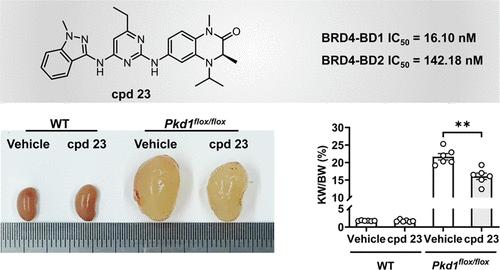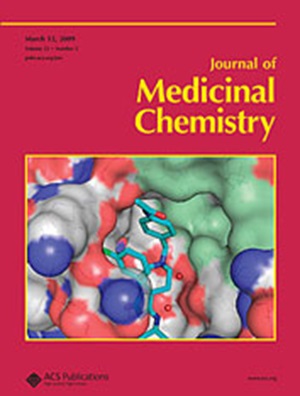选择性BRD4抑制剂治疗常染色体显性多囊肾病的设计
IF 6.8
1区 医学
Q1 CHEMISTRY, MEDICINAL
引用次数: 0
摘要
表观遗传调控通过调控基因表达和蛋白功能在抑制肿瘤进展中起关键作用。常染色体显性多囊肾病(ADPKD)以肿瘤样进展为特征,可通过抑制囊肿扩张来治疗。值得注意的是,表观遗传调控因子BRD4与ADPKD的发育有关。我们之前的研究揭示了一类(pyrazol-3-yl)嘧啶-4-胺化合物作为有效的BRD4抑制剂,具有额外的激酶抑制作用,可能会诱导不必要的生物活性。为了解决这个问题,本研究侧重于通过结构引导设计创建选择性BRD4抑制剂,最大限度地减少脱靶激酶相互作用。具体来说,化合物23在ADPKD的细胞和胚胎肾模型中是一种有效的、选择性的BRD4抑制剂,在小鼠模型中也取得了令人鼓舞的结果。总的来说,这些结果突出了靶向BRD4抑制作为一种安全有效的治疗ADPKD策略的治疗潜力。本文章由计算机程序翻译,如有差异,请以英文原文为准。

Design of Selective BRD4 Inhibitors for the Treatment of Autosomal Dominant Polycystic Kidney Disease
Epigenetic modulation plays a pivotal role in restraining tumor progression by governing gene expression and protein function. Autosomal dominant polycystic kidney disease (ADPKD), characterized by neoplastic-like progression, can be managed by inhibiting cyst expansion. Of note, the epigenetic regulator BRD4 has been implicated in ADPKD’s development. Our prior research unveiled a class of (pyrazol-3-yl) pyrimidin-4-amine compounds as potent BRD4 inhibitors with additional kinase inhibition, which might induce unwanted biological activities. To address this, this study focused on creating selective BRD4 inhibitors through structure-guided design, minimizing off-target kinase interactions. Specifically, compound 23 emerged as an efficacious and selective BRD4 inhibitor in cellular and embryonic kidney models of ADPKD, along with encouraging outcomes in murine models. Collectively, these results highlight the therapeutic potential of targeted BRD4 inhibition as a safe and efficacious strategy for managing ADPKD.
求助全文
通过发布文献求助,成功后即可免费获取论文全文。
去求助
来源期刊

Journal of Medicinal Chemistry
医学-医药化学
CiteScore
4.00
自引率
11.00%
发文量
804
审稿时长
1.9 months
期刊介绍:
The Journal of Medicinal Chemistry is a prestigious biweekly peer-reviewed publication that focuses on the multifaceted field of medicinal chemistry. Since its inception in 1959 as the Journal of Medicinal and Pharmaceutical Chemistry, it has evolved to become a cornerstone in the dissemination of research findings related to the design, synthesis, and development of therapeutic agents.
The Journal of Medicinal Chemistry is recognized for its significant impact in the scientific community, as evidenced by its 2022 impact factor of 7.3. This metric reflects the journal's influence and the importance of its content in shaping the future of drug discovery and development. The journal serves as a vital resource for chemists, pharmacologists, and other researchers interested in the molecular mechanisms of drug action and the optimization of therapeutic compounds.
 求助内容:
求助内容: 应助结果提醒方式:
应助结果提醒方式:


